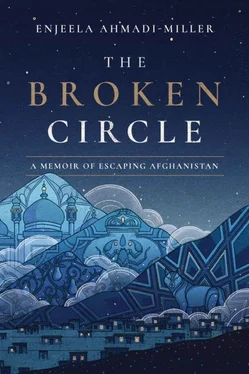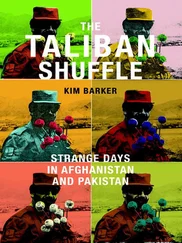Another one of my friends was Sophia, from Kabul. She asked me if I had ever visited Paghman, a beautiful park outside Kabul where everyone went for picnics on Fridays.
“My parents often took us there to fly kites and to play,” I said. “I love that place.”
“I used to enjoy it the most of all,” she said. “I hope to see it again one day.”
“So do I.” I thought of all the other places I wanted to see again. Glancing up and down the dirt lanes of the camp, I felt so far from the carefully manicured Paghman Gardens.
Our little group grew to be good friends. Even though I pretended to be one of them, they all knew I was just a visitor. I always came with clean clothes and didn’t have to wear the same outfit week after week. They didn’t seem to care, but it bothered me that I wasn’t one of them. Because of my family, I’d escaped not only the war but the destitution so many others experienced every day. I had a nice warm bed and a shower whenever I wanted one and plenty to eat, thanks to Padar. I had no answers why I should be so blessed, but I thanked God for it.
I wished there were a way for my friends to escape that camp.
There was an epidemic of hopelessness that ran rampant up and down each lane of tents, behind every canvas flap, in and out of endless food lines. Under the stale odors of cooking oil and overflowing latrines, these refugees were homeless. They had no idea where they would go next to start a new life. I began to wonder if the people of Afghanistan had been cursed.
One night after dinner, we didn’t go to the camp. Padar had us all sit down in the living room of our small apartment for a talk.
“We cannot get passports here in Islamabad,” he said. Disappointment dripped from his voice.
We all tried to speak at one time, asking him why.
“It’s very complicated with the embassy. The Afghan embassy here doesn’t want to help because of my work with the Americans. They say I must return to Kabul to apply through the proper channels for a visa. The Americans say they can’t help get a visa without identity papers. As refugees, we are supposed to get special exceptions, but they say it will take a long time. There are so many refugees applying.”
“How long?” Zia asked. We’d already been in Islamabad nearly five months.
“It could take a few years.”
We were all silent. The hope that I would finally see Mommy began to drain out of me. I had not received a letter, heard her voice, or seen her face in nearly three years.
“Are we going to be stuck here forever?” Zulaikha said, truly frantic at the idea.
Padar shook his head. “I’m not returning to Kabul for any reason. The government will put me in jail, and you will become orphans.” He rubbed his short beard, thinking. “We can’t wait a year. It’s too dangerous for us to stay here much longer, but I have another plan that will get us to India much sooner.” He folded his hands and gave us a confident smile.
“What? What?” we all stammered to find out what he had figured out.
“I have a very good friend in Karachi. We will stay with him for a while. He’s very influential in the city. He’ll help us get our identity papers, then we’ll go to India.” He smiled in that rueful way he did when he wasn’t giving us the full story. Maybe it was all those years working in the American embassy, where he learned not to talk about the things he knew. He’d gotten good at keeping secrets. As much as I believed him when he said we would get identity papers in Karachi, I felt a deep disappointment that we couldn’t leave for India from here.
The other day, Laila had taken out a map she had purchased in Peshawar when we were trying to figure out how many miles we had walked out of Afghanistan. I had traced a finger along a route from Islamabad to New Delhi, where Mommy lived. Laila said it would take only a day to drive that far. We could take a taxi or a bus or a train and be there tomorrow if we had passports. Instead, we were going to Karachi, which was way south, almost to the sea.
“Are we going to spend another year in Karachi waiting around?” Zulaikha asked with a tone of disbelief.
He laughed; his smile warmed the room. “You’ll see. Don’t worry, it won’t be anything like you’ve experienced so far. Karachi will be very nice.”
“Have you heard from Mommy? Is she well?” I asked, my excitement growing.
“I haven’t talked to her since leaving Kabul. The last time I spoke to her, she was recovering from her heart surgery.” His face grew grave. “It was a very long operation.”
His words had that neutral tone, as if he were speaking about the weather or the crops from his land. He wouldn’t talk any more about her. I didn’t want to think of not having a mother when I reached the end of this journey. So I didn’t.
We were on our way to see her, even if we had to travel to every city in Pakistan to get our papers. I believed this was happening because I kept positive thoughts even when it was difficult to do so.
On my next trip to the refugee camp, I told all my friends the news. I hoped they would be happy for me, but all I saw was sadness. I realized I should not have told them. They were so naïve, like my friend Mina.
Later that day, when I began to pack my new clothes, I felt selfish. I had so much, and my friends in the camp had so little. I packed most of the clothes in a bag to take to the camp.
“Who are you taking these to?” Zia asked, nudging the bag with his toe.
“To the kids!” I replied. “You should donate some of your clothes to Youssef. You have way more than you need.”
Zia shook his head. “Youssef is too young. He won’t fit into my clothes.”
“He’ll grow into them!”
Zia finally gave me some of his clothes, and Laila gave me some of hers too to take when I went to say my final goodbyes.
On my last trip to the camp, I was excited to give my friends these gifts, and they were happy to receive them. Yet it was a very difficult goodbye for all of us. We hugged and cried for a long time. I knew I wouldn’t see them again.
When I went home, the rest of my packing was easy—I’d kept only two outfits. When Padar found this out, he beamed. I could tell he was proud of us. If I could have, I would have given my friends all of my belongings. I was on my way to see Mommy. I had everything I needed.

We rose in the early morning while the city was quiet and hauled our luggage from our apartment to the curb, where a cabbie waited to take us to the train station. It took an entire day and night and into the next morning to reach central Karachi. We ate and slept on the train as it rattled south, making innumerable stops along the way. When our taxi finally pulled into the driveway of a beautiful three-story home with big wooden doors, my exhaustion vanished. Every window was lit up like they were waiting for us. Padar jumped out, strode up to the front door, and rang the bell. We all piled out of the back seat, glad to stretch our legs, and followed him. A gentleman dressed in all white answered with his two daughters behind him. The two men hugged, then ushered us all into the warm light of the home. The man in white with a wide smile and neatly combed black hair leaned toward me. “Hello, little one, my name is Abbas.”
He asked each of us our names, and we each said salaam in greeting. His daughters, Habibah and Daliyah, greeted us as honored guests. Habibah was in her twenties, and Daliyah was around eighteen. They both had long brown hair worn in a single braid, tan skin, and hospitable brown eyes. They took us on a tour of the house, which was huge and colorful, like it had come right out of an Indian movie. The first things I noticed were the windows: they were made of stained glass in blue, pink, and green, and they were tall, like in a church, with flowing, gold curtains. One big room had windows all over, and they were all open, so I felt like I was in a room with no walls. Another room downstairs had a swing set hanging from the ceiling. Over the weeks we stayed here, I spent a lot of time swinging.
Читать дальше













